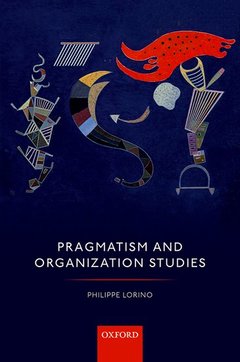Description
Pragmatism and Organization Studies
Author: Lorino Philippe
Language: English
Subject for Pragmatism and Organization Studies:
Pragmatism and Organization Studies
Publication date: 02-2018
370 p. · 16.4x24.2 cm · Hardback
Publication date: 02-2018
370 p. · 16.4x24.2 cm · Hardback
Pragmatism and Organization Studies
Publication date: 02-2018
370 p. · 15.8x23.5 cm · Paperback
Publication date: 02-2018
370 p. · 15.8x23.5 cm · Paperback
Description
/li>Biography
/li>
Many streams of research in organization and management have criticized the mainstream view of organizations as decision-making and information-processing structures, controlled through rational representations (substantive or procedural rationality). In spite of their differences, these streams of research share some key theoretical principles: Their processual view of organizing as 'becoming', their emphasis on the key role of action and action meaning; their interest in the agential power of artefacts and objects; the exploratory and inquiring nature of organizing. This book argues that Pragmatist thought can contribute to those approaches offering some theoretical argument, both as a general intellectual orientation and as a conceptual toolbox. As a general attitude, Pragmatism develops a radical critique of all the dualisms which often hinder organization studies: Thought and action, design and utilization, decision and execution, reality and representation, to name a few. As a conceptual toolbox, Pragmatism can contribute and clarify key concepts for organization and management studies, such as inquiry, semiotic mediation, habit, abduction, trans-action, and valuation. However, Pragmatist thought is still little known by organization and management scholars and by reflexive managers. The proposed book aims at making pragmatist key notions accessible to them and applicable to theorize organizations and transform managerial practices.
Philippe Lorino is Distinguished Professor of Management Control and Organization Theory at ESSEC Business School (Paris) and an adviser to the French Nuclear Safety Authority. He has previously served as a senior civil servant in the French Government, in charge of industrial policies, and as a director in the finance department of an international computer company, in charge of designing new cost and performance management systems. He draws from pragmatist authors (philosophy, semiotics and social science) to study organizations as continuous processes of organizing, more precisely collective inquiries aimed at understanding and transforming collective activity, mediated by management techniques and tools.
© 2024 LAVOISIER S.A.S.




